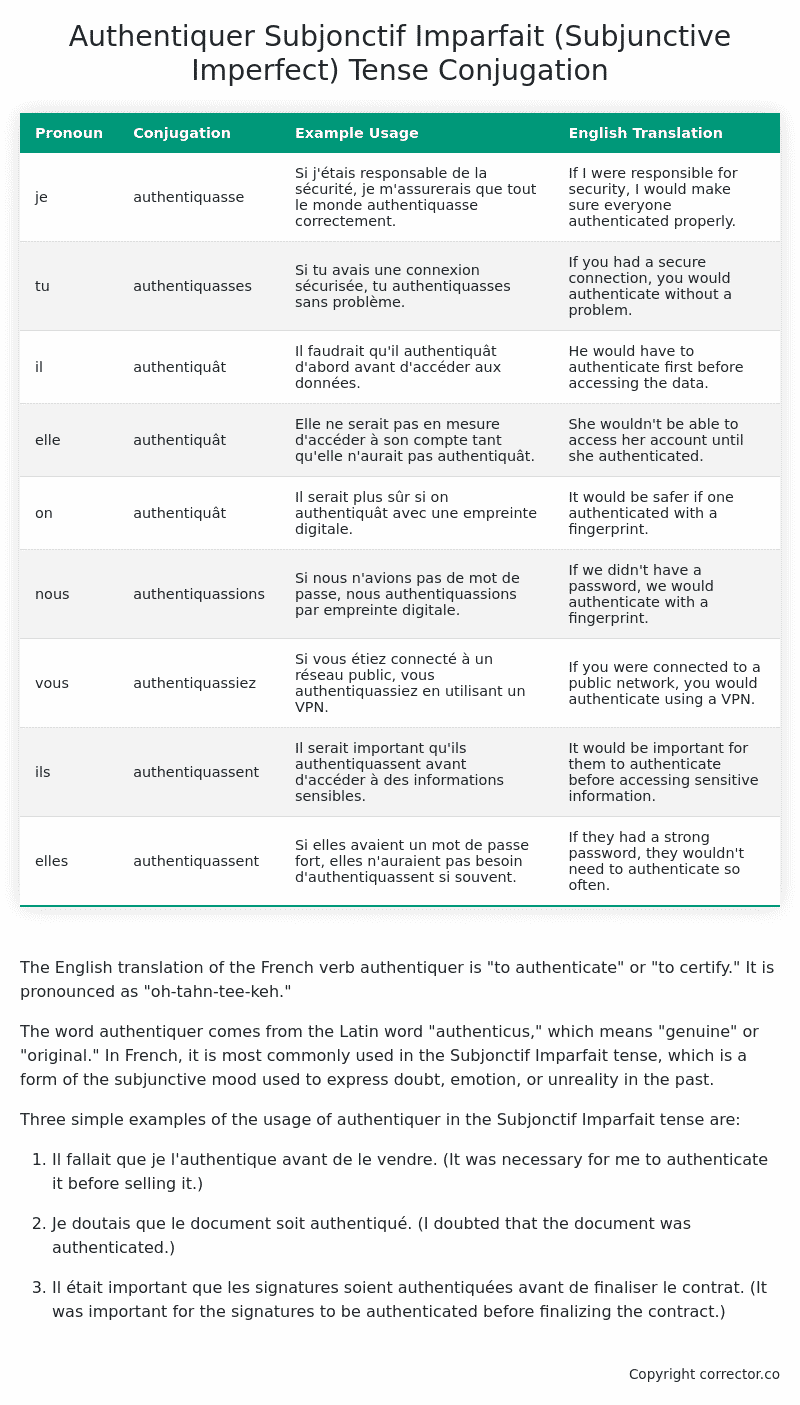Subjonctif Imparfait (Subjunctive Imperfect) Tense Conjugation of the French Verb authentiquer
Introduction to the verb authentiquer
The English translation of the French verb authentiquer is “to authenticate” or “to certify.” It is pronounced as “oh-tahn-tee-keh.”
The word authentiquer comes from the Latin word “authenticus,” which means “genuine” or “original.” In French, it is most commonly used in the Subjonctif Imparfait tense, which is a form of the subjunctive mood used to express doubt, emotion, or unreality in the past.
Three simple examples of the usage of authentiquer in the Subjonctif Imparfait tense are:
-
Il fallait que je l’authentique avant de le vendre. (It was necessary for me to authenticate it before selling it.)
-
Je doutais que le document soit authentiqué. (I doubted that the document was authenticated.)
-
Il était important que les signatures soient authentiquées avant de finaliser le contrat. (It was important for the signatures to be authenticated before finalizing the contract.)
Table of the Subjonctif Imparfait (Subjunctive Imperfect) Tense Conjugation of authentiquer
| Pronoun | Conjugation | Example Usage | English Translation |
|---|---|---|---|
| je | authentiquasse | Si j’étais responsable de la sécurité, je m’assurerais que tout le monde authentiquasse correctement. | If I were responsible for security, I would make sure everyone authenticated properly. |
| tu | authentiquasses | Si tu avais une connexion sécurisée, tu authentiquasses sans problème. | If you had a secure connection, you would authenticate without a problem. |
| il | authentiquât | Il faudrait qu’il authentiquât d’abord avant d’accéder aux données. | He would have to authenticate first before accessing the data. |
| elle | authentiquât | Elle ne serait pas en mesure d’accéder à son compte tant qu’elle n’aurait pas authentiquât. | She wouldn’t be able to access her account until she authenticated. |
| on | authentiquât | Il serait plus sûr si on authentiquât avec une empreinte digitale. | It would be safer if one authenticated with a fingerprint. |
| nous | authentiquassions | Si nous n’avions pas de mot de passe, nous authentiquassions par empreinte digitale. | If we didn’t have a password, we would authenticate with a fingerprint. |
| vous | authentiquassiez | Si vous étiez connecté à un réseau public, vous authentiquassiez en utilisant un VPN. | If you were connected to a public network, you would authenticate using a VPN. |
| ils | authentiquassent | Il serait important qu’ils authentiquassent avant d’accéder à des informations sensibles. | It would be important for them to authenticate before accessing sensitive information. |
| elles | authentiquassent | Si elles avaient un mot de passe fort, elles n’auraient pas besoin d’authentiquassent si souvent. | If they had a strong password, they wouldn’t need to authenticate so often. |
Other Conjugations for Authentiquer.
Le Present (Present Tense) Conjugation of the French Verb authentiquer
Imparfait (Imperfect) Tense Conjugation of the French Verb authentiquer
Passé Simple (Simple Past) Tense Conjugation of the French Verb authentiquer
Passé Composé (Present Perfect) Tense Conjugation of the French Verb authentiquer
Futur Simple (Simple Future) Tense Conjugation of the French Verb authentiquer
Futur Proche (Near Future) Tense Conjugation of the French Verb authentiquer
Plus-que-parfait (Pluperfect) Tense Conjugation of the French Verb authentiquer
Passé Antérieur (Past Anterior) Tense Conjugation of the French Verb authentiquer
Futur Antérieur (Future Anterior) Tense Conjugation of the French Verb authentiquer
Subjonctif Présent (Subjunctive Present) Tense Conjugation of the French Verb authentiquer
Subjonctif Passé (Subjunctive Past) Tense Conjugation of the French Verb authentiquer
Subjonctif Imparfait (Subjunctive Imperfect) Tense Conjugation of the French Verb authentiquer (this article)
Conditionnel Présent (Conditional Present) Tense Conjugation of the French Verb authentiquer
Conditionnel Passé (Conditional Past) Tense Conjugation of the French Verb authentiquer
L’impératif Présent (Imperative Present) Tense Conjugation of the French Verb authentiquer
L’infinitif Présent (Infinitive Present) Tense Conjugation of the French Verb authentiquer
Struggling with French verbs or the language in general? Why not use our free French Grammar Checker – no registration required!
Get a FREE Download Study Sheet of this Conjugation 🔥
Simply right click the image below, click “save image” and get your free reference for the authentiquer Subjonctif Imparfait tense conjugation!

Authentiquer – About the French Subjonctif Imparfait (Subjunctive Imperfect) Tense
Formation
Common Everyday Usage Patterns
Interactions with Other Tenses
Subjonctif Présent
Indicatif Passé Composé
Conditional
Conditional Perfect
Summary
I hope you enjoyed this article on the verb authentiquer. Still in a learning mood? Check out another TOTALLY random French verb conjugation!


